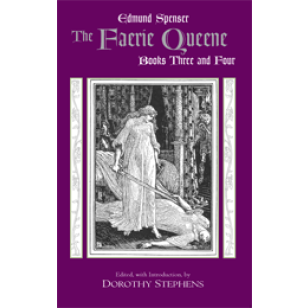The Faerie Queene, Books Three and Four
"Stephens's introduction to books 3 and 4 [offers] a guide to approaching the poem's grammar and syntax, meter, and significant theme's as well as a list of possible questions for discussion based on issues addressed in recent criticism. . . . Stephens addresses the nature and content of Spenser's poem from a modern perspective backward, rather than from a medieval or early modern perspective forward—an orientation that may be more comfortable for less sophisticated readership and which helps to ground The Faerie Queene in a broader literary tradition."
—Rachel E. Frier, Sixteenth Century Journal
eBook available for $13.95. Click HERE for more information.
The Faerie Queene from Hackett Publishing Company:
Spenser's great work in five volumes. Each includes its own Introduction, annotation, notes on the text, bibliography, glossary, and index of characters; Spenser's "Letter to Raleigh" and a short Life of Edmund Spenser appear in every volume.
---------
These paired Arthurian legends suggest that erotic desire and the desire for companionship undergird national politics. The maiden Britomart, Queen Elizabeth's fictional ancestor, dons armor to search for a man whom she has seen in a crystal ball. While on this quest, she seeks to understand how one can be chaste while pursuing a sexual goal, in love with a man while passionately attached to a woman, a warrior princess yet a wife. As Spenser's most sensitively developed character, Britomart is capable of heroic deeds but also of teenage self-pity. Her experience is anatomized in the stories of other characters, where versions of love and friendship include physical gratification, torture, mutual aid, competition, spiritual ecstasy, self-sacrifice, genial teasing, jealousy, abduction, wise government, sedition, and the valiant defense of a pig shed.
Reviews:
"Teachers of Spenser will also welcome two more installments of the Hackett editions of separate books of The Faerie Queene under the general editorship of Abraham Stoll, this time on books 2 and on books 3 and 4. In my view, these are the most attractive, inexpensive, but also comprehensive editions to date, with far better (and easy to read) notes on mythology and name symbolism (matters increasingly foreign to our undergraduates) than almost all previous versions."
—Catherine Gimelli Martin, Studies in English Literature 1500-1900
"Stephens's introduction to books 3 and 4 [offers] a guide to approaching the poem's grammar and syntax, meter, and significant theme's as well as a list of possible questions for discussion based on issues addressed in recent criticism. . . . Stephens addresses the nature and content of Spenser's poem from a modern perspective backward, rather than from a medieval or early modern perspective forward—an orientation that may be more comfortable for less sophisticated readership and which helps to ground The Faerie Queene in a broader literary tradition.
"Stephens's edited volume is a teaching text, and, as she explains in the introduction, the glosses, notes, and annotations are intended to guide the reader toward becoming progressively adept at comprehension, interpretation, and analysis. Annotations become increasingly interpretive to offer departures for readers' continued analysis, which benefits those newly acquainted with the text or those interested in examining some of the finer details of Spenser's rhetoric, and dovetails nicely with the material of introductions to the other volumes in this series."
—Rachel E. Frier, Sixteenth Century Journal






